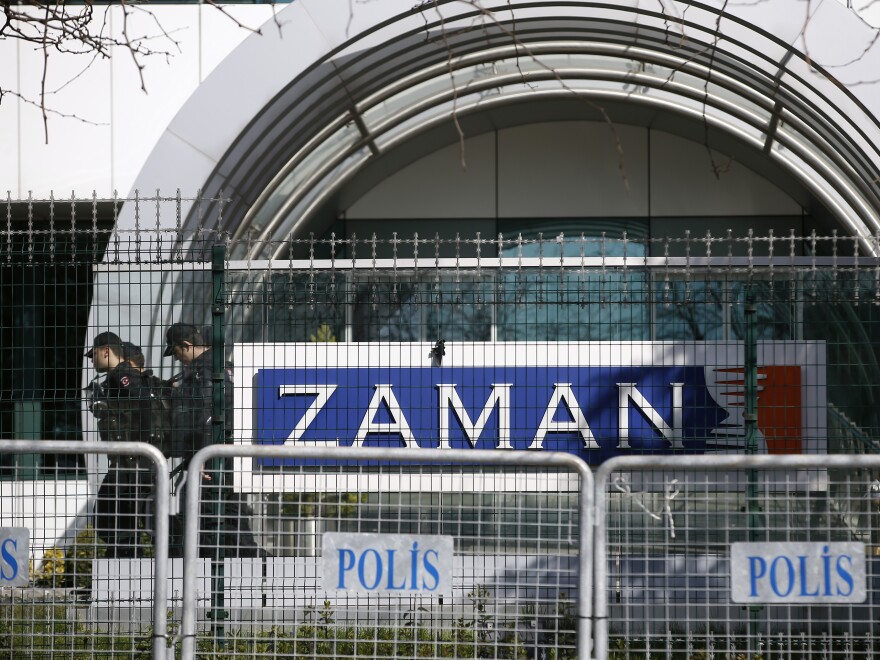Not long ago, Turkey was held up as a regional model: a Muslim-majority state with a thriving democracy and a market economy. These days, though, it's more often seen as a country where a ruling party with no serious opposition is drifting toward authoritarian rule.
President Recep Tayyip Erdogan led the Justice and Development Party (AKP in its Turkish acronym) to power in 2002, in a breakthrough victory for politicians gathered together from earlier, failed Islamist parties. The AKP has won every election since.
For Turkish liberals like Sahin Alpay, the AKP's early days as pro-democracy reformers are now memories from another time. Alpay, a veteran newspaper columnist, remembers that first AKP platform fondly. It was, he says, "the most liberal political party program ever in the history of the Turkish Republic."
Alpay, now in his early 70s, has lived through much of that history. His grandparents came to Turkey from Greece in the upheavals that led to massive population transfers in the 1920s. His parents embraced the former elite, the so-called "Kemalists," followers of the Republic's founder, Mustafa Kemal Ataturk. They enforced a secular Turkish nationalism that brooked no dissent.

The young Alpay liked the secular part but was appalled by the Kemalists' undemocratic tactics, especially the military coups that regularly put down opposition parties in the latter half of the 20th century.
So in 2002, when Erdogan and the AKP burst onto the scene, Alpay wrote a column headlined "A Victory For Democracy." It wasn't Erdogan's working class background or charisma that attracted him, but the program of reforms he offered.
Here was something new under the Turkish sun: a party run by devotees of political Islam that proposed something Ataturk never had, European-style democratic institutions and freedoms.
"The centerpiece of the program was, 'We want to have Turkey as member of the European Union, and we're going to reform the country,' " Alpay says. "And they had a clear vision of a market economy."
Foreign investment soared and living standards began to rise. The death penalty was abolished and minorities gained basic rights. By this time, Alpay was a columnist for Zaman, a paper linked to Fethullah Gulen, a U.S.-based Turkish cleric and the AKP's powerful ally. Alpay wrote columns defending the ruling party against attempted coups and cheered as the military's longstanding dominance over Turkish politics was cut back.
It wasn't until early 2011 that Alpay began to have doubts about where Erdogan was leading the country. The AKP had won another election decisively, and Erdogan gave a famous "balcony speech" in which he vowed to represent all Turks, not just those who voted for him.
But Alpay took note of Erdogan's other speeches — the ones attacking an independent judiciary and calling for a strong Turkish president, an office Erdogan would later win.
Then came the Arab Spring uprisings, which Alpay says gave AKP leaders dreams of Muslim Brotherhood-style governments across the region. Large anti-government protests in Istanbul in 2013 were crushed, with many demonstrators prosecuted. Opposition media outlets were at first threatened, and then sometimes taken over.
Alpay now believes Erdogan no longer stands for reform — or even any particular ideology.

"I think it's a gang of people who are united in their financial and political interests," he says. "So it's a terrible situation, and I think Mr. Erdogan is leading the country into very, very dire times."
These days, Erdogan remains popular with conservative and religious Turks, while his critics face a growing crackdown. The security forces are on the streets almost constantly, either responding to terrorist attacks or putting down protests.
More than 1,000 academics were arrested for calling for peace with the Kurdish minority. Social media platforms such as Twitter and Facebook have been periodically shut down or filtered.
As for Alpay, he can no longer air his opinions in the pages of the Zaman newspaper, since police stormed its offices and installed court-appointed trustees earlier this month.
Overnight, the country's largest opposition paper began offering uncharacteristically glowing coverage of Erdogan's struggle against those he calls the "accomplices of terror."
In a recent speech, the president warned of further crackdowns. "Being an academic, author, journalist or an NGO executive does not change the fact that this person indeed is a terrorist," he said.
Civil liberties groups — who have heard autocratic leaders in other countries use similar logic to silence dissent — say with a divided and weak opposition, the country will likely face more attempts to bring the population to heel behind its powerful president.
Copyright 2023 NPR. To see more, visit https://www.npr.org.




